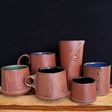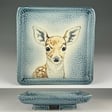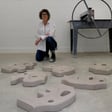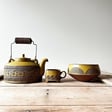Introduction and Newsletter Invitation
00:00:00
Speaker
Hey, real quick, before we get started, if you want to dive deeper into the techniques and the lessons I've learned from the potters I've interviewed, come join the Shaping Your Pottery newsletter to dive deeper and learn more about pottery. Go to shapingyourpottery.com forward slash newsletter or click the link in the description. If you love pottery and want to take your skills to the next level, you're in the right place. Find your own pottery style right here on Shaping Your Pottery with Nick Torres. Let's get started.
Improving Skills Through Practice
00:00:29
Speaker
If you and I both sat down and made 18 handles, both of us would have better handles at the end. Jessica, welcome shape your pottery and share with me what's a commonly held belief in the pottery world that you passionately disagree with. Well, let's see. I'm going to talk about beginners. And I think that the commonly held belief for beginners is that you're going to make things that are recognizable pretty early on in your practice. And so a lot of times when my beginners come to class, I like to ask them what their goals are for the class. This is people who have never touched clay. So a lot of times they're like, oh, I want to make a set of mugs or I want to make ah ah a plate set or something.
00:01:22
Speaker
And I try to like gently sort of reveal to them that their goal for the next six weeks is going to be to just make something that is recognizable as a cylinder.
Prioritizing Skill Development Over Sales
00:01:35
Speaker
So I think maybe along those lines, a commonly held belief is that you should sell your work as soon as possible or even at all. And that you need to be making things that are like recognizable products that are good to be sold or whatever. so I think there's just a lot of emphasis on production rather than actual like efficacy or the like product itself like being a good thing.
00:02:08
Speaker
That is kind of a long winded answer. But I guess the commonly held belief is, you know, we should sell our pots. I see people who are like one year in selling pots. And then I also see people who are just starting out in pottery being really concerned with things being like recognizable pottery. And you really need to have a long stretch of time where you just worry about the new technical problem that you just set yourself on, which is how to throw a cylinder on the wheel, how to throw a bowl, how to do these very basic things. So the basics tend to be sort of undervalued and people just want to like zoom ahead to like final product, being on Etsy or doing a market or, you know, those kinds of things. Absolutely great. Shaping Nation, you don't have to be selling your pottery right away. Focus on building your skills, focus on the basics so you can later on make the best possible pottery
Pottery for Personal Joy and Socializing
00:03:06
Speaker
that you can make. Absolutely love that.
00:03:08
Speaker
so or or even Or even just to interrupt, or even at all. like It's okay for us to have hobbies that don't turn into businesses, and it's okay for us to have things that we do that are not a part of, that are not a commodity, that are not like a polished, perfect thing that needs to be sold in the world.
00:03:30
Speaker
Absolutely. A hundred percent agree. If you want to make pottery as just for art, for just for fun, you could do that. You don't have to sell your pottery. Definitely agree. A hundred percent. So tell my story, how you got started making pottery.
00:03:44
Speaker
Well, I would say you know for a lot of people, i mine story is probably very similar. I had pottery in high school. And for me, it was really about hanging out with my friends. And so I didn't really even care early on what I made or how you know I didn't ever think about selling my work. It was really just about having this chunk of time every day. It was like a 45-minute class.
00:04:09
Speaker
where we could you know listen to music and get on the wheel, maybe make something, maybe not. you know Maybe you would have all failures that day, who knows. There was just a very low stakes situation where i could just you know I was free to explore. Really, the goal was to hang out with my friends as much as possible. and Pottery was great for that because you know you can be talking a lot while you're working in clay. so so Yeah, that's how I got started. and Absolutely love that. So tell me a story about when you decided to start teaching pottery.
Teaching Pottery and Skill Enhancement
00:04:45
Speaker
Well, okay, so I did pottery all through high school and then I went off to community college and I took more pottery classes and then I went off to finish my degree and I took more pottery classes and took a little glassblowing.
00:05:00
Speaker
And really it just became apparent at that point like pottery is in my life. Like it's just like basically something I will always do. I think for a lot of people that's their sport, you know, like some people are like, I just go to the gym. That's just what I do. I go five days a week or whatever. It's like that's what it was. The studio was for me. So I always knew part of pottery was going to be a part of my life.
00:05:20
Speaker
I didn't ever really expect to teach pottery, but I thought at some point I would sell. But I was working in a community studio as a studio assistant, classic kind of studio assistant situation where you have an exchange for labor, you get to use the you know the studio for free. And I was in there one day and I was just you know wrapping up my open studio shift where I was just kind of the attendant. And the woman who ran the classes for the Art Center came in and she was going to she was getting ready to like take her first pottery class.
00:05:57
Speaker
I was like, oh, that's so fun. And so we were just chit chatting and then the time and then more students were filing in and more students were filing in. And I thought, well, I better get out of here. This class is about to start. And then she turns to me, she goes, do you know where the teacher is? And I was like, yeah, no, I have no idea. And I don't know, you know, I don't know their phone number. I don't know. There was one of these people who was like, this was before cell phone. So it was just like somebody who was like notoriously hard to get a hold of. And she's like, she turns to me, she goes, well, what are we going to do? And I was like,
00:06:27
Speaker
Oh, what are we going to do? I have no idea. I guess we're going to do our best. And so she was like, well, can you teach it? I was like, I guess, I guess I'm going to have to. So I did. I taught my first class that night. We had to like, you know, go find where the clay was stored and then figure out then I had to like on the spot, figure out how to teach them how to throw a s cylinder. And, you know, it was very adventurous sort of moment.
00:06:54
Speaker
that, you know, when it's over, sort of the kind of thing where at the end of the night, you're sort of like, Oh, man, who didn't expect that to be my night. I thought I was just gonna go hang out with my friends and watch TV or something. So yeah, that was my first time teaching. And then after that, they were like, Oh, so do you want to be a teacher here? And so then I started teaching there regularly. And, you know, similar to a lot of my teaching experiences, or, you know, a lot of my experience in pottery,
00:07:19
Speaker
Teaching has required me to level up my own personal practice game. So I you know had no idea how to teach someone how to throw a cylinder, but learning to explain that to somebody else made me throw better. So that was kind of a fun moment that I feel like I didn't choose to teach. It just sort of chose me and then it just kept happening. What were you feeling when you were just put on the spot and you had to teach that class right there and there?
00:07:48
Speaker
I think it was sort of like, really, me? And I think it was like a time in my life, you know you're in your mid 20s, I don't know, I didn't have any plans. I think if it were now, I'd be like, oh, I gotta get home. like after forgot This is not what I had scheduled for tonight, sorry. you know I think I was just sort of like, well, I guess this is my emergency now, but I don't really, you know i didn't it didn't feel like my emergency, it felt like somebody else's emergency sort of gifted to me.
00:08:14
Speaker
It didn't feel weird. I think it felt, you know, it felt like I was capable and that maybe I could have done it sooner, but I just didn't know that I could have done it sooner and you don't know something like that until you try. And since then, you know, I've gone, I had another art center. They were looking for a pottery teacher and they actually like asked me to come in. This is a couple of years ago. They actually asked me to come in and demo like a teaching, like how I would teach pottery. And I was sort of like, okay, I guess so.
00:08:42
Speaker
You know, I know that I can teach pottery. There's no question, but I guess they need to see it. I had never really been tested in that way. It was sort of like, oh, here you go. It was exciting. It was fun. It felt like we got through a hard thing, you know, as a community and a community studio is very much like, you know, it's very, they're very scrappy often and things are often like, you know, as most nonprofits situations,
00:09:08
Speaker
you're often just kind of fielding problems as they come at you. And so I think I just sort of was rolling with it. So now you mentioned that it helped you level up your own pottery skills. Tell me more about that.
00:09:20
Speaker
Well, I think, you know, I was really, really, well, so for a couple years, I taught kids mostly. I did teach some adults, mostly beginners, but I taught kids and I worked with another artist who was so good at teaching little kids. I'm talking like six to 10 year olds.
00:09:41
Speaker
he would have them all lined up you know in front of us, all the wheels, boom, boom, boom, six or seven kids. And he would have them centering, opening, and pulling up walls like together. We were all locking our arms and walking down the yellow brick road road. And I think I learned so much by the way that he taught children. ah learned how to That's basically how I like applied teaching adults.
00:10:07
Speaker
And I felt super comfortable teaching adults beginners for a long time, if it was my comfort zone. And then after a while, and I think, you know, as a teacher, I taught high school as well. I taught high school art. I didn't teach ceramics in high school, but... You know, as a teacher, you often get, you find your comfort zone and you kind of just want to stay there because teaching's a lot of work. And it's really nice after a while when you sort of have your curriculum down. Like, I know what a six-week pottery, seven-week pottery class is going to look like. I know on night one, we're going to cover this. On night two, I've all figured out.
00:10:45
Speaker
After a while, i started to get I started to get a little bored because you really do get the same questions over and over again. And I am so happy for that because there's nothing wrong with the questions, right? Because I have answers. I already know the answer. I sometimes know what their question is going to be before they even ask me. There's like so much I can tell by watching a a beginner throw.
00:11:06
Speaker
I can tell if they're too heavy-handed. I can tell if they're someone who needs to put more effort. I know so much about them and their personalities. I can sometimes tell if they're perfectionists. So i I got really dialed in for beginners. And then I started getting bored. And then I thought, well, I guess it's time for me to start inching into intermediates. I started teaching intermediates in person. And then also I started teaching beginner potters online. And I was doing these free workshops. And, you know, I would get these questions, you know, I would I would have these open studio sessions where people could ask me, you know, they could basically request what kind of they would ask questions ahead of time. And then that would require sometimes I would be like, Oh, I can just demo that.
00:11:52
Speaker
But then sometimes it would be a demo where I had to go and do research, right? So I don't want to talk about closed forms until I've like sat down and thrown closed forms. You know, I can do it for myself. But if I'm going to explain it to somebody else, I kind of have to know it through and through.
00:12:08
Speaker
And so that sends me on a journey. It's like, oh, well, here are all the things people do with closed forms. Oh, this is how this person does closed forms. You know, that research, which kind of send me down a rabbit hole. And that in turn would send me, you know, sort of back to my own work, you know, after I taught the class, whether it was in person, intermediate, or whether it was online with these online students that I was having connection with. And it would really affect, you know, my own work because suddenly I'm like, whoa,
00:12:35
Speaker
yeah, I actually love closed forms. Oh, you know, and then I would start working on them and start doing more with them. And then in turn, it would make my work better. And then that also would fuel me to be a better teacher. So the next time I went to go teach that closed form or whatever, I would have more to say about it. So it's just been a really nice kind of like back and forth between teaching and making teaching and me.
Common Pottery Mistakes and Tips
00:13:01
Speaker
Absolutely love that. So what would you say?
00:13:05
Speaker
are some of the common mistakes beginners or even intermediate wheel throwers make when throwing on the wheel? Well, i would just let's talk to intermediates because beginners, you know, we all know the beginner struggle, but I would say what happens is you you're a beginner. You start making things that are recognizable and that you're proud of and you should be proud. There's nothing wrong with being proud. You should be excited. And it's fun to start making things that like are usable and you you can give them away and you're not embarrassed, right? Then I would say the minute you can kind of do a cylinder and a bowl, I really quickly start calling people intermediate because they basically they know the basics and everything after that is intermediate, to be honest, and they're ready to like kind of let their wings spread a little bit.
00:13:59
Speaker
The thing I notice with intermediates, the first thing that we need to do is we need to throw a lot of cylinders and we need to cut them open and we need to see what's going on inside because a lot of times there's a lot of clay being left at the bottom and we don't realize it.
00:14:14
Speaker
The second thing is that people are taking too long to get to a final form or to get to the point where they're shaping. So they will spend a lot of time pulling up because they don't have that control over the pull-ups.
00:14:31
Speaker
And ideally you want to be raising the walls of your cylinders in three to four poles. And then the rest of your time, unless of course you're working on a much larger amount of clay, but a lot of times people take 10, 11 poles to get things up and You really want to, that you know, the more time you spend pulling up, the more moisture is being absorbed. There is like a window of time that we can work on our pots and we want to allow ourselves the most of that window to be used in shaping. So I would say making sure your walls are thin and even, getting things pulled up in less, in three pulls, three to four pulls.
00:15:15
Speaker
And then I think the other thing people do is they shape and they pull up at the same time. So often I have a goal form that I'm looking for. And like, let's say I'm throwing a bowl. This is just for like a regular sort of ramen shaped bowl. I will throw a cylinder that is like slightly wide at the top, right? Rather than just a cylinder. So I throw a cylinder that's slightly wide at the top with a rounded bottom.
00:15:44
Speaker
I don't belly it out until the last minute. And a lot of times people will try to pull up and get their clay up from the bottom and be shaping at the same time. And then eventually they don't really have much control when they're doing that and their shape changes a lot along the way. It's really better to establish your walls, establish your thickness, and then sort of nail the form that you want and give your you know get your clay to the final state as quickly as you can so it doesn't end up You know, absorbing too much water and turning into a floppy mess. That was some excellent pieces of advice. Absolutely. I'm like sitting there thinking, again am I making some of these mistakes?
00:16:25
Speaker
I mean, truth be told, a lot of what I've learned is from Cynthia Bringle, who is a ceramic artist in the mountains of North Carolina. She lives near, she lives at Penland and she's 86 years old and she has been making, you know, she made pots with hamada. So, you know, she's been making pots a long time. And the first thing she had us do was throw 18 cylinders and cut them open.
00:16:49
Speaker
And then we threw 18 mugs and put three handles on each mug. And then you know you're not keeping a three-handled mug. You might keep one for novelty. But, you know, that
Joy in Pottery Beyond Commercialization
00:17:00
Speaker
leads me to the the the other thing that is a real sort of tell for experience is, or just a tell for what you've been avoiding is like, what do your handles look like?
00:17:11
Speaker
a handle I've seen some incredible pots with some really atrocious handles and there's nothing wrong with that we we don't need to work you know I'm not shaming anyone but it just is a point where we're just like okay I kind of have to work on that before we go any further because it's really not going to serve me to like keep fun it's frustrating to to go to make handles and feel feel like they aren't working. But if I tell you right now, Nick, if you and I both sat down and made 18 handles, both of us would have better handles at the end. So it's never done. We're never done with our we never have our perfect handle, despite what some people will tell us, but that there's always room for evolution and that there's always room for improvement.
00:17:56
Speaker
Absolutely great shaping nation sometimes you have to sit down and just make a bunch of pots and by the end of it You're gonna be learning so much and you're actually gonna find So much learn so much about how you throw and how you make stuff as well. Absolutely love that So let's talk about your pottery. Can you tell me a story how you started making the pottery that you make today? I Will say I don't commodify my pottery currently. And that is something that's been really important to me. I've spent a lot of time making and selling ceramic jewelry. And I think I started out by making pottery, and then I would sort of make jewelry on the side. And then I started to realize like, oh, people are buying this jewelry, and this is easier to get into markets. Oh, this looks really different than what everybody else is selling.
00:18:48
Speaker
Meanwhile, my pottery that I was making at the time, I would say it was like not like I was still searching for like a surface decoration technique or glaze colors that I liked. It's really, really hard to do that searching while also trying to sell your work.
00:19:08
Speaker
because it's always going to happen that you go to market and you're getting instant feedback from your customer. And that's normal, right? That's the way business works is that you put your product out, you receive the feedback, you take the feedback in, you refine the product, you bring it back to market, you see if you can sell more of it, right? And so I felt much more comfortable doing that with jewelry. So for a long time, the last seven years or so, I was mostly making jewelry.
00:19:35
Speaker
And i was sort of I was sort of playing with ceramic pottery forms on the wheel on my own without selling it. And the nice thing about that is that freed me up to just make what I was curious about. And so right now with my wheel thrown stuff, I make mostly functional work in a white stoneware clay body with a lot of translucent glazes that I mix myself and mix and color with mason stains.
00:20:07
Speaker
And then the forms have been decorated a lot of times lately with a wax water etching technique and technique where I wax on a design and then I wipe away the clay and it leaves this raised brushwork on the surface. Absolutely love that. So you are inspired by functional pottery and graphic design. Can you tell me more about this?
00:20:33
Speaker
I love functional pottery. I've realized it more and more. I mean, I always knew I love functional pottery, but I don't know if anybody's ever had a partner get into the thing that you're into, but my husband over the pandemic got into pottery and he is so delightful.
00:20:51
Speaker
But i've what I've noticed about him, he is unburdened by the constraints of of function. So he'll make a plate and he'll then like fold it up like a taco, and then he'll put little feet on it, and then it'll kind of teeter back and forth. All of which, when just watching that process like drives me a little ah crazy.
00:21:13
Speaker
But I love it. I love it for him, right? But for me, like my goal, and I come from a background in food and food
Functional Pottery Philosophy
00:21:22
Speaker
service and working on farms. And so food and you know cooking and serving is very important to me. i was you know I've done everything from growing to serving all along the way.
00:21:34
Speaker
in between. I've baked, I've cooked, the front of the house, back of the house. So I really love it when a piece of pottery is in service. It's sort of invisible a little bit. And then you're sort of like quietly delighted by it if you notice it. But otherwise, it's sort of like the table. It's just like meant to be there. And it's sort of meant to hold things up.
00:21:56
Speaker
and be a container for things. And it's it's kind of like, I think a little bit of a metaphor of how I feel as a teacher. It's like my job my job there is to create space that allows for a particular thing to happen. And I'm not supposed to be the star of the show. The star of the show is the students, right? So with pottery and functional pottery, like the star of the show is the food.
00:22:18
Speaker
And how well does it, ah how good does it feel to interact with that, that mug? You know, I had somebody, this is going to sound so weird, but I had somebody tell me one time, I feel like when I use your mug, I feel like, I feel like it's trying to make out with me.
00:22:34
Speaker
And I like thought that was so weird, but also I was like, yeah, that's what I want. like i want This is a very intimate experience. like Somebody is putting their beverage, sometimes their first beverage of the morning is is going right up to their face and they're drinking it and they're using it to nourish their body. I mean, we can go on all kinds of tangents about what kind of what that means and how important that is. right I feel honored to make functional work. I feel honored to have it be used for nourishment. So yeah, like functional work to me is like, it's like in one hand, it's like such of like invisible, like means to an end. But then on another hand, it can have like a real kind of intimate kind of significance to it. Absolutely loved it. I always say pottery is all about a connection, your hands to the clay, the clay from when it's finished and whoever's using the pottery as well. It's all about connection. Yep.
00:23:30
Speaker
Absolutely loved that so you've been making pottery for around 25 years. What keeps you motivated to keep making? It's a really good question. I think at this point that is a very mysterious question I have no idea what the answer is I think it's like it's a muscle that if I didn't flex it I would miss I would like I would atrophy and I would feel sad somehow that I didn't you know, kind of like do that I for my process I think What I really enjoy is like, I think about it in terms of like, there's a like tiny little thread. And I'm just like pulling on the thread and I'm seeing how far you know how much of that thread can I pull on to get more information in order to keep going with the process right so if I'm working.
00:24:17
Speaker
on say like the elusive like perfect plate bowl you know pasta bowl or something or those like large like East Fork has those coop the coop just like this very generous sort of plate bowl what keeps me going is I haven't quite gotten there yet Or like you get it, but you just get it, or you get it, but there's this other piece that you want to now explore. So I think it's just that like nothing is ever going to be done or finished or perfect in pottery ever. And there's always more to be curious about and more to be diving into. like you can never I'll never get to the bottom of the barrel of things there are to learn about pottery. There's always going to be more to discover.
00:25:06
Speaker
Absolutely agree. Shaping Nation, the more you are curious, and the more you just try to learn, the less likely you're going to be bored. You're going to be able to make pottery for a long, long time. Absolutely love that.
Finding Your Unique Pottery Voice
00:25:16
Speaker
So let's talk about discovering your voice. Can you tell me about the moment when you knew you were heading in the right direction with your pottery? I i think it wasn't until Recently, when I started doing, I messed around with underglazes for a really long time. I thought, I love pattern. I love print. I want that on my pots, right? And no matter what I did, it was okay. It was fine. But I wasn't like hungry for more. I wasn't like,
00:25:48
Speaker
I wasn't, it didn't fire me up. I just was like, okay, that's cool. I can do that. I can also try other things. But when I recently started doing water etching, that really kind of like really lit me up, really got me excited about what are these different glazes going to look ah like on top? what kind of you know And then I got to do some atmospheric firings where I was like ah you know doing some salt firings, which had a totally different effect. Different you know glazes on top of things, different textures on top of my clay before wiping away. you know I think so. It what really wasn't until recently. Here's the thing about finding your voice.
00:26:34
Speaker
If you try to find your voice, it's gonna feel really painful. So that's how I felt anyway. It was like, the more I like tried to find my voice, the more tortured and the more of like, a like I felt like I was having like an identity crisis. Like, should I even be making pottery? like Am I even a potter? you know yeah Am I even like worthy of creating this work? Or you know should I even be considered ah an artist?
00:26:59
Speaker
um I think the thing with finding your voice, the the basics of it is, is that you have an opinion about how something should be done. And every time you sit down to throw and every time you sit down to decorate and every time you sit down to or go to glaze, you and then when you fire, you know, and then the clay you pick out, all of this is expressing a preference at every point. Oh, I prefer this clay. Oh, I prefer that glaze. Oh, I prefer that color. Oh, I prefer that brush over this other brush.
00:27:34
Speaker
Oh, I want this connection to be invisible. Oh, I want this connection to be visible. All of those choices all add up to your voice. So you won't need to try to find your voice. All you have to do is listen to yourself.
00:27:52
Speaker
maximize the time spent doing the things that you want to do. And don't do the things that you don't want to do. This sounds so dumb. But you know, somebody was like, Oh, I know this potter. He always he always he stands all of his pot. You know, the whole surface, everything gets sanded.
00:28:13
Speaker
And I said to the person like, well, you know, I don't really like sanding my pots. So I don't do that. And I'm not going to make pots that require sanding because I don't want to spend my time sanding. So I had.
00:28:28
Speaker
Another teacher, his name is Nick Jirling. He actually is another potter in the mar mountains who was a student of Cynthia Pringles. And he was doing a demo once and somebody asked him, do you have a studio assistant? Like, I think they were sort of like, maybe I could be his assistant, you know?
00:28:44
Speaker
And he said, you know, I don't have an assistant because there's really nothing along this whole process that I don't want my hands in. And I want to maximize my time spent.
00:29:00
Speaker
Doing all the things that I do all along the way and all of the things that I don't want to do I actually have just eliminated so, you know that I think some total it's just describes like what it's like to Create a voice. It's like you just enjoy all the pieces that add up to Making this piece that you've that's resulted in this piece that you've made Absolutely Greece shaping nation If you want to be able to find your voice, don't try so hard to actually find your voice. Focus on what brings you joy and eliminate the things that you don't enjoy in pottery. And that's how your voice comes to life. Absolutely love that. So what would you say was your biggest obstacle when it came to finding your own voice?
00:29:44
Speaker
I think just being self-conscious and having a little annoying sort of like maybe like not very helpful voice that was like you know telling me I wasn't good enough. I think yeah also but yeah something that happens a lot we can't help it but I really don't go on social media anymore because I think it's just like, it is helpful in some ways to see you know how what people are doing, and how they're doing it. It is very um informative. But I think that it can be a little paralyzing to, there's just inevitably going to be compare and despair.
00:30:24
Speaker
So I think, you know, use social media for what it for what it's intended to be is like entertainment, right? But if you're finding that you are seeing other people's work and it's resulting in you thinking you questioning your own work or questioning your own validity.
00:30:43
Speaker
There's room for all of us. There's room for every voice in here and every stage of every step of the way, every kind of potter from beginning to advance to, you know, professional.
Encouragement and Community Support
00:30:58
Speaker
And don't ever let anybody tell you that you're you need to be a certain level in order to, you know,
00:31:05
Speaker
exist in this space. We all deserve to be here. But I will say there is a certain amount of compare and despair. So that is a struggle. So I would say avoid, avoid comparing yourself to others enough. You know, you do want to see what's out there. You do want to see what's what's happening and what people are up to. But also at the same time, I'm blissfully unaware of what people are up to.
00:31:27
Speaker
Absolutely love that shape nation Don't compare your work to other powders or if you're gonna compare use as a way to help grow your own work Like maybe you're trying to learn a new technique and that's how you're gonna use comparison to help you grow your own work. Absolutely love that now What do you think it means to find your own voice and pottery? I honestly think that what it means is you are Someone can look at a piece and they can tell that it's yours. I mean, that's like the simplest way to put it. I had...
00:32:03
Speaker
ah pot I took a bunch of pots in today, a bunch of you-know-me's cups and brought them into class today, because we were starting a mugs class. And I was talking about this one maker, it was a couple that made pots. They stopped making pots sort of like in the 2010s, I think. Their names were Ruggles and Rankin. And I can see, I was saying how I had this one you-know-me from them, then a couple years later quit making pots and they moved out west.
00:32:34
Speaker
You can still find some of their pots in the thrift stores around here, which is like shocking. And I found one actually, I found a bowl and I could see it from across the room. And I was like, that's a Ruggles and Rankin. You know, that's a $250 bowl. I'm going to get that bowl for $15 or whatever they were charging for it. I was like, just take my money.
00:32:54
Speaker
I think when you can, when someone else can recognize your work, that's, you know, and and maybe that's not a great definition because that requires other people to be recognizing your work. But I think when you feel like you have a distinctive sort of like voice that you're adding to the conversation of pottery. And it certainly isn't required in order to make pottery. You don't have to have your own voice. You can make pots that are covered in tomato red that look similar to other people's pots, and that's fine. But I think that's what sort of defines it for me is when I can look, when I can spot your pot across the room and I can be like, oh, that's so-and-so, that is a really strong voice.
00:33:34
Speaker
Definitely agree 100%. Jessica, it's been a wonderful challenge today. And as we're coming to a close here, what is one thing you want to hammer home with my listeners today?
Sharing Knowledge Generously
00:33:44
Speaker
Let's see. You might have to edit some of this out. Let's see. I'm going to hem and haw for a minute. I think I'm not sure what level, your potter your your people are probably at all different levels. you know The clay community has always been extremely generous and very there's just a lot of sharing that happens. And I think it's so important for us to continue to sort of like contribute to that community in the but with the same spirit. And so be generous with yourself
00:34:22
Speaker
in how you talk to yourself as you progress along your path. Be generous with other people when they ask you, you know, oh, how did you make that? Or what kind of clay is that? There can be some people who are a little bit worried about proprietary information. You know, nobody's ever going to do anything that looks just like you. If you start selling work and someone starts making work that looks like your work,
00:34:49
Speaker
It's time to just move on and make different stuff because they will never be you and you're already moving on to the next thing. And you're already like pulling on the next thread and moving on to, don't worry about what other people are doing.
00:35:04
Speaker
Yeah, just stay curious, stay interested. If you sell your work, don't worry about you know trying to make it be what other people want it to be unless unless you really just want to be a production potter and just make make things that don't that you're not emotionally attached to. but You know, leave room for you to be creative and to make things that are without the opinion of other people. Cause that's really like our own interest and how we dive into that and how that shows up on a forum can be really magical. Definitely agree. That was some excellent parting words advice. Jessica, it's been wonderful chatting today. Where can my listeners go and learn more about you?
00:35:44
Speaker
I have a website, it's JessicaSamford.com, and then you can find me on social media, at claywithjess. And I also have a pottery group that is beginner and i intermediate pottery students. It's on Facebook, and you can just search beginner and intermediate, and probably that group will pop up. It's beginner and intermediate pottery students with Jessica Samford. And yeah, you can also get my jewelry under October Forever.
00:36:13
Speaker
Hey thanks for listening to this episode of Shaping Your Pottery with Nick Torres. If you want to master the art of pottery and dive deeper into the techniques of the potters I interview, I created a newsletter that does just that. It dives deep into the techniques of the potters I interview. If you want to learn more, go to shapingyourpottery.com forward slash newsletter or click the link in the description to learn more.







